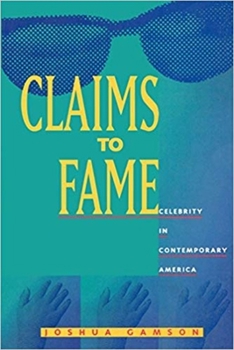Claims to Fame: Celebrity in Contemporary America
Select Format
Select Condition 
Book Overview
Moving from People magazine to publicists' offices to tours of stars' homes, Joshua Gamson investigates the larger-than-life terrain of American celebrity culture. In the first major academic work since the early 1940s to seriously analyze the meaning of fame in American life, Gamson begins with the often-heard criticisms that today's heroes have been replaced by pseudoheroes, that notoriety has become detached from merit. He draws on literary...
Format:Paperback
Language:English
ISBN:0520083539
ISBN13:9780520083530
Release Date:March 1994
Publisher:University of California Press
Length:270 Pages
Weight:0.98 lbs.
Dimensions:0.7" x 6.0" x 8.9"
Customer Reviews
2 ratings
book review and brief analysis
Published by Thriftbooks.com User , 16 years ago
Claims to Fame. What is at stake in the contemporary society of spectacle is the struggle for controlling the impact of the "signs of the real" (p. 7) over the mass of consumers and their possible resistance. The question of authenticity and realness has been present since the early celebrity consumer culture. Once a text is recognized as public and drowned into the flow of the social circulation, its ambivalence of being readable either in logical or mythological ways shapes it with an `inconvenient' edge; but in contemporary culture this problem is framed by the omnipresence and awareness of a third agent: the machine (p. 34) which is un-detachable from the celebrity-text. The industrial machinery increasingly is drawn into the narrative it produces, making the industrial process less a vehicle for the product and more a part of it, in a similar way as brands do to the commodities they label. The still broadly accepted assumption in media studies stating that emancipation from authoritarian media depends on "demystifying" processes, achieving awareness by unveiling the machinery of production is challenged by Gamson when he demonstrates that alienation (production/consumer) is not overcome with information because information is immediately reconverted in entertainment. This finding invites further analyses to understand why and how Celebrity-watching audiences "bracket" evidence for the sake of maintaining their consumption not as endings but as instrumental mediations for their everyday ritualizations. Audiences simultaneously play voyeuristic and performing roles (p. 139) making the axis of the watcher and the watched a superficial layer (a pre-text) "serving" underlying and ongoing conversations (both private and public). A commonality in all sorts of interpretive communities is their joyful engagement in the decoding and reading of texts. Hermeneutic pleasures attired with playful attitudes are fully consonant with other meaning-making experiences where media consumption is used as a pre-textual resource, even in practices deemed as "serious" as religious practices . As seen with the "game players", there is an ability of decreeing at will the realness of an event, in spite of being acknowledged its fictitiousness. This contempt to what is real or fictional makes the former an irrelevant factor, as long as the story is kept as a sufficient resource for maintaining the social conversation. Hence, belief is self-consciously perceived as a matter of choice based on how much a belief suits ones' needs, since the text itself has no particular authority (p. 179). Skepticism (truth and reality as undeterminable) is not a belligerent statement but a strategy to keep the conversation ongoing. In doing so, the text's original intention of being consumed as reliable information is subverted and reconverted into an ironic tool of resistance. The original alienation (the gap between the production and the consumer) and the implicit one-way commun
THIS book
Published by Thriftbooks.com User , 22 years ago
Sometimes when people read a book and then review it, the review reflects what it is that they wanted the book to say and do rather than what the book in fact sets out to say and do. (And when academics review a book, instead you get an essay on what they would say if they wrote the book. But they didn't, so back to the book at hand.) Gamson's treatment of celebrity is not Berger or Spengler's or anyone else's...it is his. And it is pretty good.





